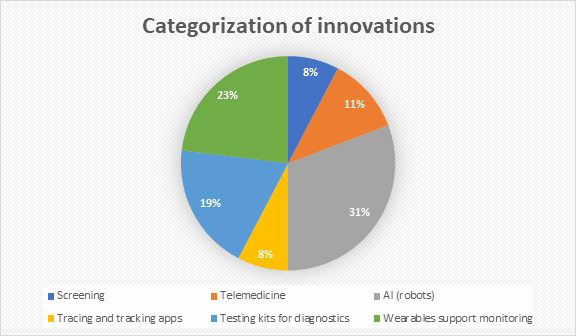Innovation for hospitals during COVID-19
In India, the healthcare industry is one of the fastest growing sectors in terms of investments, employment, etc. It comprises many sectors under it such as the hospitals (public, private), public health, wellness centres, medical devices, medical tourism, clinical trials, medical devices, health insurance, health IT, telemedicine, medical equipment and much more. The sectors expand all over the country and covers both the rural as well the urban areas with the help of primary, secondary, tertiary and quaternary healthcare institutions and hospitals.
The Covid-19 pandemic which started in China in December 2019 and hit India in late January 2020 has made the whole world come to a standstill, harming literally everything ranging from the economy to every individual’s life. It has locked almost one-third of the population indoors. The sector which is facing a major damage due to the pandemic is hospitals, both public as well as private. The number of Covid-19 cases continue to grow worldwide and many hospitals are struggling to deal with the situation of treating patients and other aspects of running the hospitals. The three main challenges faced by the hospitals are: finding additional beds, ventilators, creating new spaces for the increased number of patients. Apart from this, there are several others on the list as follows.
Some of the major challenges faced by the hospitals:
- One of the major challenges faced by hospitals due to this pandemic is the lack of infrastructure. Although private hospitals make up the majority of the healthcare system in India, still they lack the preparedness to handle a sudden outbreak of a pandemic like this and provide for the health needs for every individual of the large population such as ours. Many of the hospitals especially in states like Bihar, Odisha, etc. are not well-equipped to cover their population and detect cases efficiently. Many hospitals lack testing kits and supplies which brings down their efficiency in covering the population for testing.
- There is also a shortage of beds and ventilators for new patients to admit because of the burden of the existing patients which are already admitted for treatment. Expanding capacity and creating space for new patients has therefore become a major challenge.
- Hospitals have also reported a shortage of personal protective equipment (PPE) for their staff. Due to a sudden increase in the demand of the testing kits and PPEs in this outbreak, the supply chains have faced many issues which has also depleted the reserves of the PPEs of the hospitals.
- Apart from the shortage of beds and doctors, hospitals are also facing the shortage of medical equipment like ventilators due to which many of them are not able to treat patients efficiently.
- Another main issue faced by the hospitals is difficulty in maintaining adequate staff (both medical and para-medical as well as administrative staff). Most of the hospital staff specially those of managerial and administrative background are preferring to not actively get involved in handling the hospital systems mainly due to fear and concern. Therefore, there is a sudden rise in the requirement of manpower specially during this crisis because these are the people who are required to take the charge of running and managing the hospitals while the doctors and the nurses take up the forefront role of treating the patients.
- Also, along with testing and treating the patients for COVID-19, it is essential to keep the hospital staff safe from contracting the virus and getting infected which might lead to the shortage of staff even more. This is a challenge too for the hospitals.
- There also exists a major challenge of high run for revenues and cost control. If we see hospitals as a business, the patients are its customers. Due to the pandemic, there is a decrease in the patient visits to the hospitals because people try to avoid going to hospitals due to the fear of contracting the virus. This has led to a downfall in the revenue generation for the hospitals and hence, difficulty in operations. This has also led to many people losing their jobs or salary cuts in some cases because hospitals are not able to pay them their salaries.
- Hospitals like AIIMS and many others had to cancel or postpone the surgeries of their previous patients because they are under the pressure to free up bed space for COVID-19 patients. They are unable to handle the unmanageable patient load due to the pandemic. Every other department of the hospitals are experiencing reduction in patient visits due to reduced admissions.
- Patient safety and hazardous waste management are the other two major issues faced by hospitals as this may lead to other concerns like hospital acquired infections, rise and spread of other diseases, etc. Also, an obvious downfall in the quality of services is also seen.
Possible innovative solutions for hospitals:
A large number of hospitals and the whole healthcare sector are moving towards the machines and trying to incorporate technology into their working and systems in order to deal with the emergency situation that is prevalent right now. They plan to use automated tools to help them manage the Covid-19 pandemic. In the light of the need at this time, many innovations are happening around the world to come up with solutions to create tools and technologies so as to help us combat the virus and increase efficiency of the existing healthcare system at the same time.
Around 25-30 startups were studied and their innovations and tools related to Covid-19 were identified. The ones which concerned healthcare and hospitals were selected and a database was prepared. The products that can be deployed in hospitals to deal with the pandemic were studied and were categorized using various criterias under categories like Artificial Intelligence, telemedicine services, screening, diagnostics, monitoring, tracing and tracking.
The study shows the percentage of the innovations made in specific areas. The selection was made restricted to India to understand the progress and scope of innovations happening in the country to assist us fight the pandemic.

Many start-ups like RIoT solutions, Practo and Thyrocare are helping with the testing and care of the coronavirus patients. Leveraging Artificial Intelligence (AI) to build highly accurate respiration monitoring systems that will work as a mini ICU monitoring unit to allow doctors and other health professionals to track multiple patients and at the same time ensure safety of health workers.
Some of the big hospitals like Apollo hospitals have tied up with Zomato, OYO hotels and homes and many other organizations to provide isolation and virtual care.
DaytoDay Health which is an MIT-incubated start-up, has started a virtual healthcare system for patients who tested positive for coronavirus. The company helps people manage complex health issues, manage their medicine schedule, record their progress data, tracking, etc. These activities are done with the help of an app which has been designed to have live chats, calls, consultations. Working with few hospitals in different parts of India, they are helping in early containment of the coronavirus with the help of IT by managing asymptomatic and non-critical coronavirus patients.
Another Indian based IoT startup called HELYXON uses AI-enabled devices for better management of the pandemic by constantly monitoring the vital parameters of patients or suspects. 98.6 Fever Watch is another innovation which is useful particularly for unwell children in whom continuous monitoring of temperature is a vital parameter in disease management. It connects to hospitals systems or personal systems and keeps transferring patient information to a central dashboard.
Some of the health-tech start-ups including Dozee, Qure.ai, Log 9, MyLab and Biodesign Innovation Labs are providing solutions which range from prevention mechanisms and testing to monitoring and manufacturing medical equipment. For example, Dozee’s device is used for medical-grade remote monitoring of vital parameters including heart rate and respiratory rate to monitor vulnerable patients in their homes, or in hospitals that are facing manpower shortages.
Qure.ai has partnered with Italian San Raffaele University Hospital to deploy new solutions that automatically read and interpret chest X-Ray scans for COVID-19 in seconds. This tool quantifies how much of the patient’s lungs have been affected, enabling the clinicians to monitor disease progression more effectively.
Another start-up Log 9 claims that its device can completely neutralize Covid-19 and other pathogens on surfaces of masks, hospital PPE and groceries in less than 10 minutes.
Pune based company MyLabs has come up with Covid-19 diagnostic test kits which are priced at around 1200 rupees which saves the testing cost by many times as compared to the present cost of 4500 rupees.
Medtech startup Docturnal has proposed a solution-based product called the ‘COVID-19 Innovation’ which screens the sound of a person’s cough from home with the help of an app and identifies the suspected lung diseases.
AI Highway provides pre-screening and triage tools that are based on risk-assessment scores for Covid-19, linked to symptoms, contact history and more.
Biodesign Innovation Labs has developed ‘RespirAID’, an automated respiratory assist device, which is an alternative for prolonged manual ventilation of AMBU bags or BVM used during hospital transit of patients or transit in ambulances, and operation theatres.
Bengaluru start-up Predible Health is using AI-based radiology solutions to pre-screen COVID-19 patients with the help of a tool LungIQ, which can measure percentage of lung damage in patients through CT scans & help doctors understand how badly a patient is affected and if he needs a ventilator or not.
Cardiac Design Labs has come up with a ‘Telemetric Patient Monitoring System’. It is a centralised vitals monitoring system, which allows frontline workers to monitor multiple patients simultaneously from a central location. The system has wearable devices, which are put onto the chest of the patient. The data collected is then shared with the nursing station, which can be located out of the COVID-19 wards. It also has algorithms to alert the healthcare professionals if something goes wrong with any particular patient.
Many companies like Invento, Asimov Robotics have been building humanoid robots which can help in lessening the exposure between Covid-19 patients and the caregivers. The robots can carry food, medical or clinical consumables for the patients and navigate freely within the hospitals decreasing the burden on the healthcare staff. These are also capable of collecting patients’ information and monitoring them. Others like Diagnostic.AI, PerSapien have developed robots that can help in the sanitation of the areas in hospitals or even in the public using ultraviolet rays.
Companies like AgVa solutions, Big Band Boom Solutions, Aerobiosys, etc. are building cost-effective portable ventilators. They are also lending a helping hand in ramping up the production and supply of ventilators to the hospitals.
Clearly, most of the innovations and solutions coming up are based on technology or are related to it in some way or the other. This shows that the IT sector is incorporating itself into healthcare and is proving to provide immense help with regards to ideas and solutions to deal with the pandemic and restore the world. Telemedicine is going to be a major field in the future on which literally every sector will depend and operate.
“Care is shifting from the hospital to the clinic, from the clinic to the home and from the home to a 24/7, ubiquitous access to care, driven by the mobile phone.”
–Sangita Reddy, joint managing director of Apollo Hospitals
The remote screening solution supports healthcare institutes to diagnose and treat patients at alternative points of care and is helping to safeguard the scarce critical care capacity. AI systems that have been trained via machine learning to offer clinical decision support may play an important role in the COVID-19 crisis, helping to keep hospitals functional and patients alive.
Composed by Anamika Gandhi, InnovatioCuris

